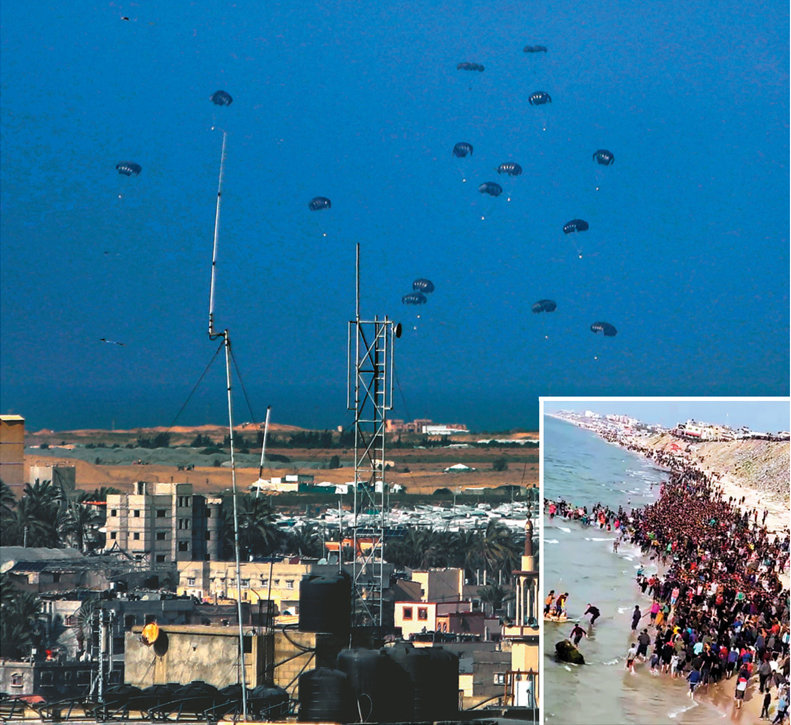As Israel begins its war against Hamas and blocks the Gaza Strip in Palestine for five months, another war called the ‘conflict over relief goods’ is intensifying in the Gaza Strip. The United States carried out an operation to scatter 38,000 relief goods into the sky using aircraft on the 2nd (local time), but for the 2 million residents trapped in Gaza, it is nothing more than ‘new blood’. There were also reports that Israel was intentionally blocking the import of items necessary for survival, such as anesthetics and respirators.
The U.S. Central Command announced that it, along with the Jordanian Air Force, dropped relief packages containing food and medical supplies on the Gaza Strip coastline. It is the fifth country to join the ‘air operation’, following Jordan, Egypt, the United Arab Emirates, and France.
The reason these countries dropped relief supplies by plane was because it had become extremely difficult to bring supplies into the Gaza Strip. As chaos in the Gaza Strip intensifies, UN agencies and international aid organizations are known to have recently reduced their support activities. On the 29th of last month, Gaza residents driven out of starvation crowded into a relief truck, but were turned into chaos due to Israeli troops firing, resulting in a tragedy in which more than 110 people died. Additionally, the UN announced that the amount of aid brought into the Gaza Strip last month was reduced by half compared to January due to Israeli far-right protesters blocking aid trucks.
Nevertheless, there are criticisms that the airdrop method is extremely dangerous and inefficient. According to the Washington Post (WP), the C-130 cargo plane used by the Jordanian military can only carry 16 12-box packages of food, including Makroubeh, a Middle Eastern rice dish. It is difficult to confirm whether the items dropped along the coastline from about 3,000 meters above the ground are distributed safely.
Yanti Soeripto, head of the U.S. branch of Save the Children, warned WP that “airdrops are a theatrical act that will fuel chaos on the ground.” Scott Paul, deputy director of the international aid organization Oxfam, said on his He fiercely criticized him.
U.S. President Joe Biden announced on the 1st that he would “take every measure possible” and explore various measures, including large-scale delivery of relief goods through ships.
 On the 27th of last month, relief supplies dropped by the Egyptian Air Force to help the residents of the Gaza Strip, Palestine, are being seen throughout the Gaza Strip. The small photo shows residents of the Gaza Strip who flocked in large numbers to secure relief supplies that fell on the coast on the 26th. Gaza Strip = Xinhua Newsis · Photo source: Social media ‘X’
On the 27th of last month, relief supplies dropped by the Egyptian Air Force to help the residents of the Gaza Strip, Palestine, are being seen throughout the Gaza Strip. The small photo shows residents of the Gaza Strip who flocked in large numbers to secure relief supplies that fell on the coast on the 26th. Gaza Strip = Xinhua Newsis · Photo source: Social media ‘X’The international community’s condemnation of the civilian tragedy that occurred in the Gaza Strip is growing, but Israel is reportedly blocking the entry of goods essential for survival. According to relief organizations and government officials interviewed by CNN on the 1st, the items Israel most often refuses to import include medical supplies necessary for survival such as anesthetics, oxygen tanks, and ventilators, as well as water purification agents, dates, sleeping bags, and maternity products. Necessities are included.
This is a particularly serious problem in a situation where the medical system has collapsed. Doctor Hani Bseiso said that due to lack of anesthetic, she had to amputate the leg of her 17-year-old nephew, who was injured in a missile attack, with a kitchen knife and tell him to endure it while reciting the Quran while disinfecting it with dishwashing detergent.
There was also testimony that the Civilian Assistance Organization (COGAT), a Palestinian civilian affairs organization under the Israeli Ministry of Defense that manages the flow of relief supplies, is intentionally withholding customs clearance without specifying a clear reason or standard. One activist said that there are currently over 15,000 tons of relief supplies awaiting approval to be imported. CNN reported that import restrictions were further strengthened after the disaster on the 29th of last month.
Source: Donga
Mark Jones is a world traveler and journalist for News Rebeat. With a curious mind and a love of adventure, Mark brings a unique perspective to the latest global events and provides in-depth and thought-provoking coverage of the world at large.